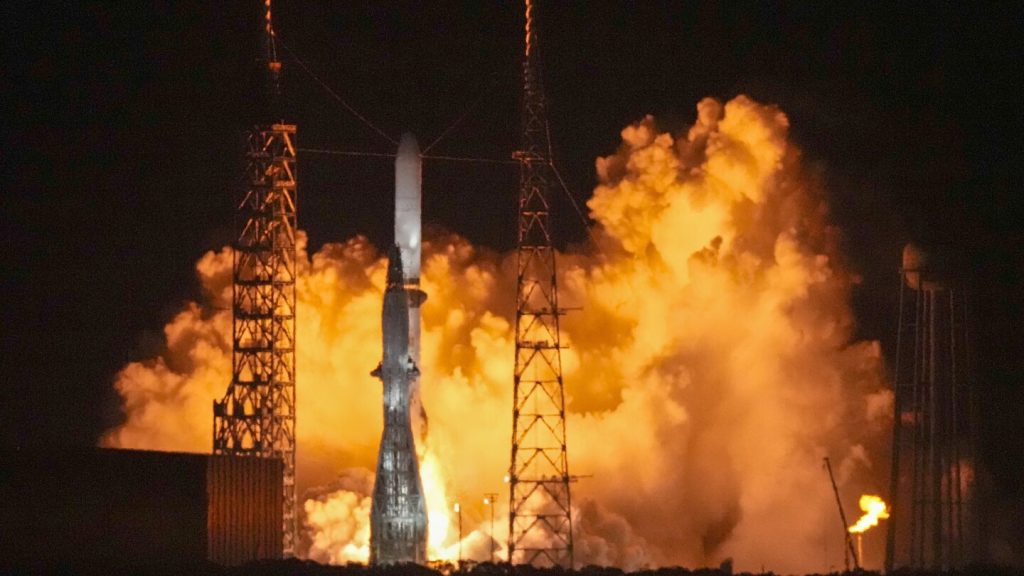Paragraph 1: A Giant Leap for Blue Origin
On Thursday, September 14, 2023, Blue Origin, the space company founded by Jeff Bezos, achieved a significant milestone with the successful launch of its New Glenn rocket. Named after John Glenn, the first American to orbit Earth, the 320-foot (98-meter) rocket lifted off from historic Launch Complex 36 at Cape Canaveral Space Force Station in Florida, the same launchpad used for NASA’s Mariner and Pioneer missions decades ago. The primary objective of this inaugural flight was to deploy a prototype satellite to orbit, a crucial step in demonstrating the rocket’s capabilities for future missions involving spacecraft and eventually, astronauts. The successful orbital insertion of the satellite sparked jubilant celebrations among Blue Origin employees, marking a significant achievement for the company and a testament to Bezos’s substantial investment in the project.
Paragraph 2: Mission Objectives and Outcomes
The New Glenn rocket’s maiden flight aimed at delivering the test satellite into a stable orbit thousands of miles above Earth. While the satellite remained within the second stage of the rocket during its orbit, the mission was designed to demonstrate the rocket’s capability to reach orbit and deploy payloads. Although the first-stage booster missed its targeted landing on a barge in the Atlantic, which was intended for recovery and reuse, the primary mission objective of achieving orbit was successfully accomplished. The second stage, containing the satellite, was subsequently placed in a high, safe orbit to comply with NASA’s space debris mitigation guidelines. The approximately six-hour mission marked a successful debut for New Glenn, paving the way for future launches and more ambitious endeavors.
Paragraph 3: Blue Origin’s Ambitions and Investments
Founded 25 years ago by Jeff Bezos, Blue Origin has steadily expanded its spaceflight capabilities. While the company has been offering suborbital tourist flights to the edge of space since 2021, using smaller rockets named New Shepard (after Alan Shepard, the first American in space), New Glenn represents a significant leap in scale and ambition. The development and launch infrastructure for New Glenn required a substantial investment of over $1 billion, including the refurbishment of Launch Complex 36. Bezos, while present at Mission Control during the launch, declined to disclose his personal investment in the New Glenn program, emphasizing a collaborative rather than competitive approach to the evolving space industry.
Paragraph 4: A New Era of Space Exploration
Bezos envisions New Glenn as a key player in the burgeoning commercial space sector. With a planned launch cadence of six to eight flights per year, assuming successful operations, Blue Origin aims to significantly contribute to lowering the cost of access to space. The successful launch of New Glenn adds to the growing roster of powerful new rockets entering service, including United Launch Alliance’s Vulcan, Europe’s Ariane 6, NASA’s Space Launch System (SLS), and SpaceX’s Starship, the largest of them all. This influx of new launch vehicles signifies a new era of space exploration, with multiple players driving innovation and expanding opportunities for both government and commercial ventures. Bezos expressed a belief in a collaborative future, with multiple companies working together to advance space exploration.
Paragraph 5: Lunar Aspirations and Partnerships
While SpaceX’s Starship is currently slated for NASA’s Artemis program, aiming to return astronauts to the lunar surface later this decade, Blue Origin also has lunar ambitions. The company’s Blue Moon lunar lander is planned for a later Artemis mission, highlighting the expanding role of private companies in NASA’s exploration plans. This parallel development of lunar landing systems mirrors NASA’s strategy for the International Space Station, where multiple providers ensure redundancy and competition. The space agency’s future leadership, however, was in transition at the time of the New Glenn launch, with the impending change in administration and the nomination of Jared Isaacman, a private astronaut and entrepreneur, to lead NASA, subject to Senate confirmation.
Paragraph 6: Future Missions and Scientific Endeavors
Originally, the New Glenn debut was scheduled to carry two NASA spacecraft, named Escapade, to Mars. Due to delays in the rocket’s development, this mission was postponed, with a new launch date planned for the spring of 2024 at the earliest. Escapade is designed to study the Martian atmosphere and magnetic environment, contributing to scientific understanding of the red planet. The successful launch of New Glenn now sets the stage for these and other future missions, marking a significant advancement in Blue Origin’s capabilities and solidifying its role in the rapidly evolving landscape of space exploration. The collaboration between private companies like Blue Origin and government agencies like NASA underscores the growing synergy between commercial and scientific endeavors in space.

